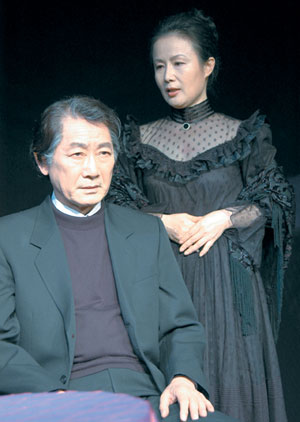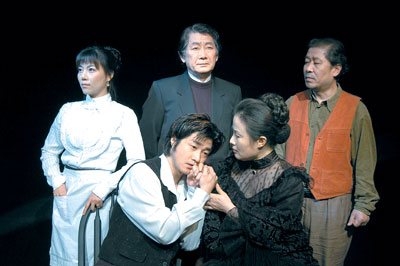The play Ghosts, a look into the invincible influence
GHOST is on the move in European society," says Karl Marx in Manifest der Kommunistischen Partei (The Declaration of Communism). By ghost, he does not just mean the spirit of a dead person; he refers to an invincible force that disrupts society. Although ghosts are never clearly perceived, the effect they have on people is obvious. People can be disturbed by them eternally as they cannot be caught, nor be clearly recognized, but yet lead an invisible existence. The play Ghosts deals with that unclear existence that affect several generations.
Masterpiece of Ibsen
Ghosts is a famous drama by Henrik Ibsen, the master of realism drama. Published in 1892, it was first criticized for its shocking subjects such as prostitution, euthanasia and incest. Today, Ghosts is evaluated as a masterpiece of social drama with a keen insight into the corrupted European society of the 19th century. Commemorating the 100th anniversary of Ibsen's death, this play is performed for the first time in Korea, directed by Im Yung-woong, with actors Jeon Mu-song and Lee Hye-kyung in Sanwoolim Theater.
Stealing Over the Living Souls 
▲ Manders and Mrs.Alving make subtle conflict between themselves
The story of Ghosts deals with Mr. Alving's family. Mrs. Alving has been suppressed throughout her life because of her late husband, who had an affair with the maid and had a child. Mrs. Alving brings up the child, Regine as a maid and sends her own son Oswald to Paris to keep him away from his father's bad influence. Having pursued charitable work, Mrs. Alving is ready to hold a ceremony for an orphanage's opening. Oswald and Manders, the priest who had once loved Mrs. Alving, come to celebrate. As the story unfolds, Mrs. Alving finds out that Oswald once had a relationship with Regine and she realizes that "ghosts" are moving around the house. She believes it is the result of her husband's bad behavior. Her thoughts are soon confirmed. When she unveils Regine's identity, Regine is shocked and escapes from the house and the orphanage is consumed by fire. To make matters worse, Oswald confesses that he is suffering from syphilis, a legacy his father left him. In the last scene, Oswald slowly approaches death. Mrs. Alving is depressed and enraged because she realized she couldn't avoid her husband's consequences called "ghosts." The play ends with Mrs. Alving's agony and whether she administers euthanasia to her son or not is left unsaid.
"Maybe all of us will become ghosts. Things from ancestors, old customs and prejudice. We are suppressed by them."
- Mrs Alving
How to Look into the Play
The play is receiving the spotlight not only because it is the 100th Memorial of Ibsen's death, but also because famous and respectable actors perform in the play. Jeon Mu-song plays the part of Manders and Lee Hye-kyung performs as Mrs. Alving. "Manders tries to suppress his individual desire and set his goal to live following the social law, rule and religion. Although he also feels love for Mrs. Alving, he rejects it because of his identity as a priest. However, throughout the play, he remains skeptic about whether he's leading a happy or righteous life," says Jeon Mu-song. Lee Hye-kyung explains her character as a "real ghost." "Mrs. Alving tries to avoid social rule, so she sends her son to Paris to escape Mr. Alving's convention but finally she realizes that she was the ghost herself because she accepts conventional rule and bad habit. Even her son has the same illness as his father although she had tried to avoid it." With each character's explanation, they advise the audience to perceive the essential existence of "ghosts" and focus on social problems the play presents.
"All the country is full of ghosts. I wish if all the ghosts would disappear and we can see the illumination."
-Mrs Alving
Social and Philosophical 
▲ All the members of the play suffer from invincible existence.
The play may burden those who are familiar with stories following the "introduction, development, climax and conclusion" pattern. Because the play doesn't have a climax and many plots are mixed up, it is not even easy to grasp the entire story. Also, the atmosphere of the play is heavy for young audiences who like sensitive and trendy plays. However, it has a noticeable meaning because it is not a common opportunity to relish a classic masterpiece play without change. In addition, while A Doll's House is well known to Korean audience, Ghosts is comparatively unknown and this is a good opportunity to encounter another masterpiece by Ibsen. Also, the actors' performances are outstanding, especially Lee Hye-kyung's dual appearance, expressing both stability and fear, and Jeon Mu-song's performance showing the priest's hypocrisy. Music, sound and the setting are also well expressed. It is sensible to use Grieg's piano concerto as background music as Grieg is another Norwegian artist along with Ibsen. The setting showing a garden with flowing water creates an atmosphere of both apparent comfort and of internal fear.
Components of the Surroundings
Although Ibsen is famous for realism drama, the play Ghosts include characteristics of Naturalism. Naturalists asserted that the people's minds, behaviors are decided by the environment surrounding them. Accordingly, characters in the drama are all affected by the dead father's influence although they don't realize it clearly. The situations in the play can also be found in modern society. In any modes, we are influenced by environment surrounding us and sometimes we do not clearly realize because it steals over our unconscious mind. This play is an opportunity to experience the dreadful, but true appearance of life.
| Interview - Woo Mi-sung (Prof., Dept. of English Lang. & Lit.) Q: What are the main characteristics of Ibsen's drama? Q: What do you think is the meaning of Ghosts? |
| The play Ghosts |

